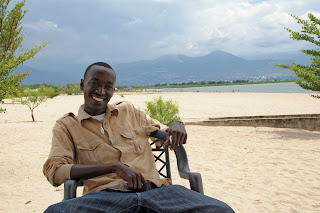 You would think at some point I would cease to be amazed at how small the world is, but it never seems to happen. My time here has been mind-blowing. It's one thing to see familiar things in Europe or even Central America, but somehow I thought heading to Bujumbura would be different. I mean it is a tiny country in the middle of Africa and it really isn't high on most world travelers must see lists. Not because it isn't beautiful, but years and years of war tend to keep the tourists away. Also, years of war and severe poverty have, sadly, pretty much ended the chance of seeing wildlife here. There are monkeys, hippos, antelope, and crocodiles, but nothing like the wildlife seen in some other neighboring countries. Given its isolation and lack of tourism, I sort of expected Bujumbura to be somehow removed from the rest of the world.
You would think at some point I would cease to be amazed at how small the world is, but it never seems to happen. My time here has been mind-blowing. It's one thing to see familiar things in Europe or even Central America, but somehow I thought heading to Bujumbura would be different. I mean it is a tiny country in the middle of Africa and it really isn't high on most world travelers must see lists. Not because it isn't beautiful, but years and years of war tend to keep the tourists away. Also, years of war and severe poverty have, sadly, pretty much ended the chance of seeing wildlife here. There are monkeys, hippos, antelope, and crocodiles, but nothing like the wildlife seen in some other neighboring countries. Given its isolation and lack of tourism, I sort of expected Bujumbura to be somehow removed from the rest of the world.In fact, it has a fascinating mix of modern and traditional. I expected to see a woman in a beautiful floral print dress walking down the street with bananas on her head, but not carrying an H&M bag. I expected there would be amazing local music, but I didn't think that our driver and I would be trading Regina Spektor for Burundian rap on flash drives. I also didn't expect to be taking salsa lessons here.
Fatima, one of the Burundian staff attorneys working on the project, studied international human rights in Paris. Salsa is, oddly enough, extremely popular in Paris and she took it up while she was there. When she returned to Burundi about a year ago, she fell into the Burundian salsa scene. So now every Saturday she gives salsa lessons to a revolving cast of twenty-somethings who drop in for a look. Her co-instructor, Simon, is just as good as Fatima and learned salsa from a Colombian who was living in Bujumbura for a while. So my first Saturday in Burundi there I was, dancing salsa (or trying anyway) at a little strip mall called "The Heart of Africa," which also houses a day spa.
On my second day at work I asked if there was a gym in Bujumbura. Sure enough there is. "Le Sports Gym" is only a block or so away from my apartment. It has a serious case of 70s decor and some dated equipment, but it works. When I commented about the gym to Fatima the next day she said, "Oh, that's where I go. You have to come to Tae-Bo class. It's killer!" So two days later I was doing a mix of kick-boxing and martial arts to hits from Eighties. Fatima was correct; The instructor is great and in incredible shape.
Today I abandoned the office early due to the lack of electricity preventing any computer use and the insufferable heat. After working some in my air-conditioned apartment, I headed to the gym. I know a few of the guys who work out there regularly now and we did our "Ca va?" "Ca va." thing and I started lifting weights. After about thirty minutes the power went out leaving the gym in complete darkness and causing an abrupt end to the step aerobics class. People gave some hoots and hollers and started turning on their cell phones to use as flash lights.
I thought everyone would start heading for the door and that the frequent power outages in the city can really spoil your day. Then I realized that the guys in the weight room were pulling the curtains from in front of the windows in the weight room to let ambient light (such as there is here at night) in from the street. After they adjusted the curtains, they got right back to working out in the darkness. I considered leaving, but thought "When in Bujumbura . . ." and kept working out too.
I said to the group of guys that I was going to write to my friends in America and say that the guys in Bujumbura are so hard core that they work out even without lights. The guys laughed and said, "That's right you tell them Burundians LOVE to exercise." About then the staff started bringing in candles and lit them up and spread them around the gym. As they walked through the gym with candles ablaze some of the guys broke into "Happy Birthday" in French. Then one guy said loudly (in English for my benefit), "Where's the cake?" They all burst into laughter and we all continued our work outs by candlelight.







